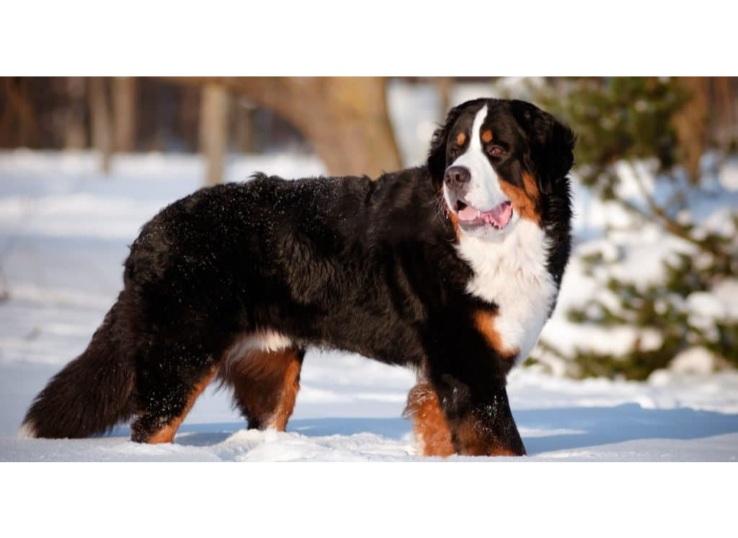Saint Bernard vs Bernese Mountain Dog: 8 Main Differences

How different are these two dogs? And which one is the best pet? Both of these breeds are kind giants with attractive natures. Thus, how can you choose which one is a better breed to take into your family? Let’s dive into Saint Bernard vs. Bernese mountain dog guide.
Table of Contents
Saint Bernard vs. Bernese Mountain Dog: Difference between these two
Bernese mountain dogs hold a shorter lifespan compared to most dogs.
| St. Bernard | Bernese Mountain Dog | |
| Height | 26 to 30 inches | 22 to27 inches |
| Weight | 120-200 lbs. | 80-115 lbs. |
| Coat type | Rough, Thick, Smooth | Long and Dense |
| Colors | brindle, brown, orange, red, white | Black and White, Rust Markings |
| Temperament | Friendly and Independent | Loving and Devoted |
| Trainability | Below Average | Above Average |
| Life Expectancy | 8-10 Years | 6-8 Years |
| Energy Levels | Below Average | Above Average |
Main Differences Between Saint Bernard and Bernese Mountain Dog

The main differences between Saint Bernard as well as Berner are size, energy concentration, and lifecycle. Saint Bernards are often larger and weightier than Bernese mountain dogs. Furthermore, although Saint Bernard, as well as Bernese mountain dogs, are associated, their origin is diverse.
For example, Saint Bernard evolved in the Western Alps of Italy plus Switzerland; however, the Berner evolved in the Berne area of Switzerland.
Let me explore a bit more into their differences.
Height
Both dogs are pretty tall; a Berner is between 22 to 27 inches tall. On the other hand, Saint Bernard stands around 27 inches tall, with male dogs standing at 28 to 30 inches tall and female dogs standing at 26 to 30 inches tall.
Bernese males weigh around 85-115 pounds, whereas females weigh approximately 80-106 pounds. Male of the Saint Bernard breed weigh between 140 to 200 pounds, whereas females weigh 120 to 140 pounds.
Coat Type
Color
The AKC admits the following St. Bernard’s colors: brindle, brown, orange, red, or rust. All of these colors are often mixed with white. Besides, all purebred Berners have tricolor fur containing black, white, or rust colorations over the eyes, near the sides of Berner’s mouth, on the anterior legs, and around the torso.
Temperament

The first difference is that, although both dog breeds make outstanding family dogs, St. Bernards are famous for their affection for kids. They are mainly delicate to their owners’ disapproval, to the point of devastation in self-confidence.
Consequently, they need a lot of love and admiration. They also do not have self-motivation and are usually sedentary. Even though Saint Bernards are famous for having a bit lower intellectual level compared to other dog breeds, they are remarkable family dogs once trained early.
On the other hand, Bernese mountain dogs also love children; however, not more than St. Bernards. Berners are correspondingly keen on their people and, therefore, are gaining admiration as therapy dogs.
Berners are more energetic compared to Saint Bernard’s, and they need a more active family. Not only do they need some extra exercise; however, but they must also be extra energetic.
Trainability
Both breeds are cheerful and willing to please their owners once we discuss training. Both are approachable to training, which clarifies why they have factually performed good in human-related aptitudes.
It is critical to start teaching your St. Bernard directly, particularly if it will enjoy most of its spell indoors. Although it is a puppy, skilled training is best to guarantee it properly recognizes social prompts and commands. Berners are easy to train.
Life Expectancy
St. Bernard lives around 8-10 years. When we talk about Bernese Mountain dogs, numerous sources describe that they live around 6-8 years, whereas others live for 7-10 years.
Energy Level
Berners have a higher activity level than other breeds, and consequently, they benefit from 20 to 30 minutes of everyday exercise. They need the liberty to roam, thus, a surrounding outdoor part is suggested, but they will choose to be inside once you are at home.
St Bernard is a relaxed dog having lower-than-average energy concentration. They are explorers at heart; however, they are equally pleased snoozing in the house. St. Bernard is a respectable companion for families.
Bernard and Bernese mountain dog, which dog makes a better pet?
Both of these breeds make outstanding family pets. They are kind, faithful, and steady. Although they are not hostile, their sheer size might also deter undesirable visitors. Because of their size, you will also have to ensure you have the money to feed a giant dog. A well-socialized, suitably trained Berner or St. Bernard will make an adorable addition to your family.
FAQs
Is a Saint Bernard greater than a Bernese Mountain Dog?
As massive dog breeds share the old-style Swiss colors, they appear similar. The smaller Berner has a 70 to 115-pound weight and is approximately 23 and 27 ½ inches tall. And Saint Bernard has much more, among 120 to 180 pounds, and it measures around 26-30 inches tall.
What 2 dogs make a St. Bernard?
They were initially bred for rescue jobs by the sanatorium of the Great St Bernard. The hospice, constructed by and called after Italian monk Bernard of Menthon, attained its primary dogs between 1660 to 1670.
Which dog breed is Scooby Doo?
Great Dane is also called Scooby Doo. It is one of the largest dog breeds. Iwao Takamoto produced the character. Takamoto searched the breed when creating the character; however, they took plenty of rights for the illusory series.
Wrapping Up
The Bernese mountain dog and Saint Bernard are gigantic and stunning dog breeds that attract care. They are connected, which accounts for their resemblance, but small modifications, for example, their size as well as activity level, make them different. Berners are more spirited than Saint Bernards and need a more active household. But, they love humans and animals and relish being with their families!
Resources
https://thehappypuppysite.com/bernese-mountain-dog-vs-st-bernard/ (Can You Tell Them Apart?)
Dodds, W.J. 1984. “Von Willebrand’s Disease in Dogs.” Modern Veterinary Practice







